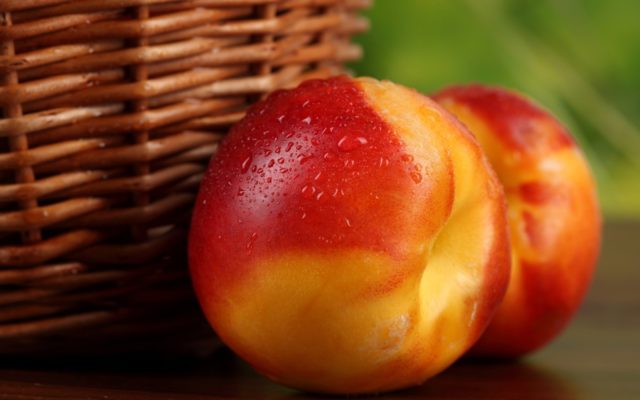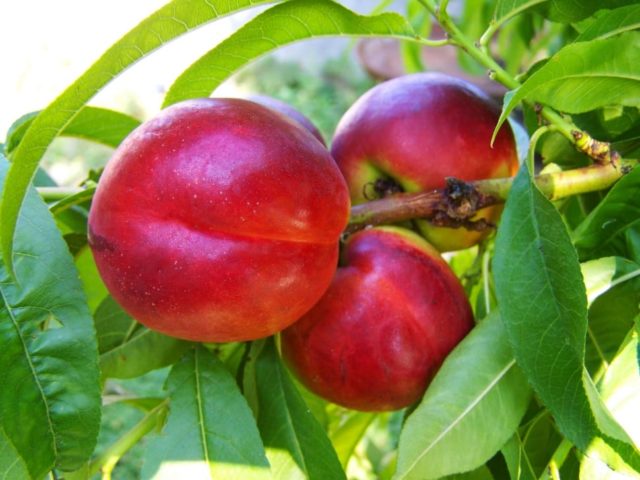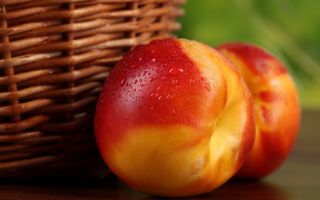Content
- 1 Is it possible to use nectarine for HB
- 2 The value and composition of nectarines
- 3 Why nectarines are useful for a nursing mother
- 4 Introduction of nectarines into the diet of a nursing mother
- 5 Rules for the use of nectarines while breastfeeding
- 6 Limitations and contraindications
- 7 Selection and storage rules
- 8 Conclusion
The benefits of nectarine are scientifically proven. But young mothers who feed their babies with milk are often wary of it. They know that red or orange fruits can cause allergic reactions. Nectarine during breastfeeding should bring benefits to both the woman and her baby, while not causing health problems.
Is it possible to use nectarine for HB
Fears of eating red and orange fruits while breastfeeding are often unfounded. The color of nectarine or peach does not mean that the child will necessarily have an allergic reaction to it. The color of the fruit is given by special pigments - anthocyanin and lycopene. These are useful substances saturated with vitamin C.

Breastfeeding nectarines and peaches are potential allergens. Their benefit or danger is not determined by pigments, but by the memory of the immune system. As a rule, allergic reactions are caused by those products that are unusual for the region of residence of a person. So, residents of the middle lane or southern regions are more susceptible to allergies to grapefruit than to nectarines or peaches, to which Europeans have long been accustomed. And in representatives of northern peoples, due to genetic characteristics, a reaction may occur with a greater probability.
The value and composition of nectarines
Nectarine is a low-calorie product. But it is rich in fiber, vitamins and some trace elements necessary for the health of a woman during breastfeeding and her baby. So, 100 g of pulp satisfies the body's daily need for the following substances:
- vitamin C - 6%;
- vitamin PP - 5.9%;
- vitamin E - 5.1%
- vitamin B5 - 3.7%;
- beta carotene - 3%;
- vitamin B1 - 2.3%;
- potassium - 8%;
- phosphorus - 3.3%;
- copper - 8.6%
- manganese - 2.7%;
- omega-6 fatty acids - 2.4%
Why are nectarines useful for a nursing mother?
Nectarines are beneficial for breastfeeding because they have valuable properties:
- improve the functioning of the digestive system;
- reduce body weight;
- strengthen the immune system;
- stabilize blood sugar;
- have an antioxidant effect;
- improve vision and condition of skin, hair and nails;
- increase hemoglobin;
- relieve constipation.

Introduction of nectarines into the diet of a nursing mother
Young mothers should introduce nectarines into their diet gradually, observing the consumption norms. Fruit should be washed thoroughly before eating. For the first time, it is allowed to eat a small piece weighing up to 30-40 g and observe the child's condition for 2-3 days. If no deviations are found, you can increase the number of fruits up to 2-3 pieces per week.
What nectarines can a nursing mother need
To protect the health of the mother and her baby during breastfeeding, it is worth choosing fruits for the season. They can only be eaten fresh. Remove the peel before use. It is she who contains substances that can cause allergies. Canned nectarines are contraindicated for breastfeeding.
Rules for the use of nectarines while breastfeeding
The fruits should be introduced into the menu gradually. It is better to try them before lunch, so that during the day you can observe the child's reaction. The fruit does not affect lactation, milk arrives in the usual quantities.
In 1 month
Immediately after the birth of a child, a woman's diet should be strict. You should refrain from consuming nectarines while breastfeeding during the first month. The intestines of the newborn during this period are not ready for such foods and may react with acute diarrhea, which leads to dehydration. This condition is dangerous for the health and life of the baby.
In 2 months
When more than 1 month has passed after childbirth, nectarine during breastfeeding can be carefully introduced into the diet to diversify it. But a prerequisite is monitoring the child's condition. If he becomes capricious, there are indigestion, rashes on the skin, then the use of the product should be delayed. If there are no side effects, then during the second month while breastfeeding, it is allowed to eat no more than two nectarines per week.
At 3 months
If in the first month nectarines with HS are prohibited, then from the third month their introduction into the diet is relatively safe. The newborn's digestive system becomes more mature. The risk of side effects is reduced.

Limitations and contraindications
Symptoms that, when changing the diet during breastfeeding, should alert a woman and become a reason for refusing fetuses:
- digestive disorders;
- colic in a newborn;
- the appearance of constipation;
- skin rashes and other signs of allergies.
Both the mother and the baby can have these symptoms.
It is worth refusing to introduce nectarines into the menu or to limit their amount in the following cases:
- the diagnosis of diabetes mellitus;
- overweight and obesity;
- a history of allergy tendencies.
Selection and storage rules
To get the most out of fruits and protect yourself from low-quality products, you should adhere to the following rules:
- Purchase nectarines during the harvest season. It falls in July and August. Fruits that appear in stores and markets earlier, as a rule, are unripe, they do not bring benefits to the body.
- Before buying, it is worth checking for damage on the fruits: rot, cracks or dents.
- To choose mature specimens, you should pay attention to the stalk - it should be brown and dry.
- The smell of fruits is also important. It is better to choose those that have a rich fruity aroma. Its absence indicates that the nectarines were ripened not on the tree, but in packaging, in the store's warehouse.
- When choosing, it is important to focus on color. It should be uniform. However, an overly bright skin color may be a sign that nitrates were used in the cultivation.
You can store fresh fruits from 2 to 5 days. Specimens that are hard to the touch remain usable for a little longer than soft ones. The latter should be eaten within 1-2 days. Fruits are best placed in plastic wrap and kept in the refrigerator.
Conclusion
Breastfeeding nectarine is a healthy product, but it must be consumed wisely.A nursing mother should correctly introduce it into her diet: know the time when you can start trying nectarine, do not exceed the permissible amount. Another important condition is the control of the child's well-being. If nothing bothers him when his mother uses nectarine, then the fruit will benefit both.

